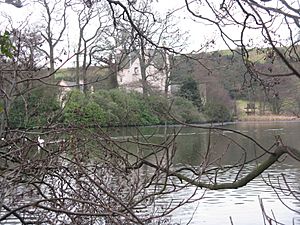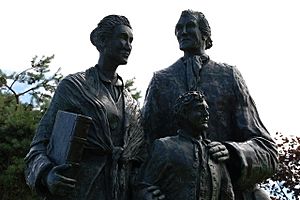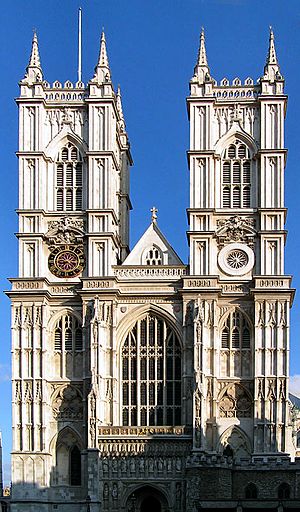Robert Blair (moderator) facts for kids
Quick facts for kids Robert Blair |
|
|---|---|

Couston Castle where Robert Blair died.
|
|
| Personal details | |
| Born | 1593 Irvine |
| Died | 27 August 1666 Couston Castle |
| Buried | Aberdour |
| Nationality | Scottish |
| Denomination | Presbyterian |
| Signature | |
Robert Blair (1593 – 27 August 1666) was an important Scottish presbyterian minister. He became a Westminster Divine, which meant he was part of a group of religious leaders who helped shape the Church of England. In 1646, he was chosen as the Moderator of the General Assembly of the Church of Scotland. This was a very important leadership role.
Blair was born in Irvine in 1593. He was the sixth son of John Blair, a merchant, and Beatrix Mure. He studied at the University of Glasgow and became a professor there in 1615. Later, he moved to Ireland to become a minister.
Contents
Robert Blair's Early Life and Ministry
Growing Up in Scotland
Robert Blair was born in Irvine, Ayrshire, a town in Scotland. His father, John Blair, was a merchant. His mother, Beatrix Muir, lived to be almost 100 years old.
Robert went to the local school in Irvine. After that, he attended the University of Glasgow. He earned his Master of Arts degree there. He also worked as a schoolteacher in Glasgow for a while.
Becoming a Professor and Preacher
When he was 22, Robert Blair became a professor at the University of Glasgow. One of his students was Robert Baillie, who later wrote many important papers for the Covenanters. In 1616, Robert Blair was given permission to preach. This meant he could lead church services in the established Presbyterian church of Scotland. He left his professorship in 1622.
Ministry in Ireland
Robert Blair then moved to Ireland. He was asked to become a minister in Bangor, County Down. He was officially ordained by Robert Echlin, the Bishop of Down, on 10 July 1623.
However, things became difficult for him. In 1631, he was suspended from his ministry. In 1632, he was removed from his position because he did not follow all the rules of the Church of England. Bishop Echlin had been understanding at first. But later, he changed his mind.
Robert Blair was briefly allowed to return to his ministry in May 1634 by King Charles I. But the ban was put back in place later that same year. He was even excommunicated, which meant he was officially cut off from the church.
Challenges and Important Journeys
Trying to Reach New England
Because of the difficulties in Ireland, Robert Blair and other ministers decided to leave. They planned to sail to New England in America in 1635. They even got a ship ready.
However, the weather was very bad. Their ship was forced to turn back. Robert Blair believed this was a sign that he was still needed in Scotland.
Returning to Scotland
After returning, orders were given for his arrest in England in 1637. But he managed to escape to Scotland. For a while, he preached in Ayr.
He was also asked to go to France as a chaplain for a military group. But after getting on the ship, he had a problem with a soldier. He decided to go back ashore.
He asked the government for permission to preach again. In April 1638, he was given a position in Burntisland. Later that year, he was appointed to St. Andrews, where he officially started on 8 October 1639.
Helping with Peace and Church Affairs
In 1640, during the Second Bishops' War, Robert Blair went with the Scottish army into England. He helped with the talks to create a peace treaty with King Charles I in 1641.
After the Irish Rebellion of 1641, he went back to Ireland with other Scottish ministers. The Presbyterian church in Ireland had asked for help with their empty church positions. He later returned to St. Andrews.
Key Roles and Later Life
A Leader in the Church
In 1645, Robert Blair was present when Robert Spottiswoode, a high-ranking judge, was executed. In the same year, he was one of the Scottish ministers who went to Newcastle to speak with the King.
In 1646, Robert Blair was chosen as the Moderator of the General Assembly of the Church of Scotland. This was a very important leadership role. After Alexander Henderson died, Blair was also made a special chaplain to the King.
In 1648, a church committee asked him to work with Oliver Cromwell to help create a single, unified religion in England.
Final Years and Legacy
In 1650, the church in Scotland split into two groups: the Resolutioners and the Protesters. Robert Blair sided with the Resolutioners, but he was sad about the disagreements.
In 1654, he was asked to go to London to help plan how to manage church matters. However, he said he was too ill to travel. In the same year, he was appointed to a group that decided who could become a minister in certain areas of Scotland.
When the King was restored to power, the church structure changed again. Robert Blair had to leave his position in September 1661. He was restricted to certain places, first Musselburgh, then Kirkcaldy for three and a half years, and finally Meikle Couston near Aberdour. As a Covenanter, he sometimes preached outdoors.
Robert Blair died in Aberdour on 27 August 1666. He was buried in the local churchyard.
Robert Blair's Writings
Robert Blair wrote several works, though not all of them were published during his lifetime:
- His Autobiography was published in 1848 by the Wodrow Society. Some parts of it were published earlier in 1754.
- He wrote a preface for a book called Durham's Treatise on Scandal.
- He also wrote a Commentary on the Book of Proverbs, which was ready but never published.
- An Answer to Bishop Hall's Remonstrance was also ready for printing but never came out.
Robert Blair's Family
Robert Blair was married twice.
- His first wife was Beatrix Hamilton. They married on 16 July 1626. She died in July 1632 at the age of 27. They had two sons, James and Robert, and one daughter, Jean. Jean married William Row, who was also a minister.
- His second wife was Katherine Montgomerie. She was the daughter of Hugh Montgomerie. They had seven sons and one daughter. One of their sons, David, became the father of Robert Blair, a famous poet who wrote a poem called The Grave. Another son, Hugh, was the grandfather of Dr. Hugh Blair, another well-known figure.
Images for kids
 | Lonnie Johnson |
 | Granville Woods |
 | Lewis Howard Latimer |
 | James West |





